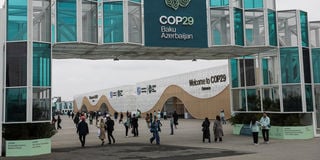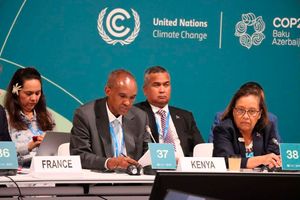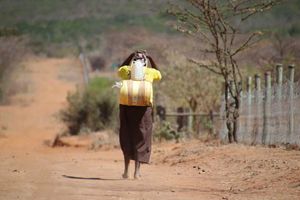The COP no longer serves its purpose, climate policy leaders say

People walk at the entrance of the venue of the United Nations climate change conference COP29, in Baku, Azerbaijan November 11, 2024.
What you need to know:
- On Friday, a group of prominent scientists, advocates, and policy leaders signed an official joint open letter addressed to the United Nations member states and Simon Stiell, the Executive Secretary of the United Nations Framework Convention for Climate Change (UNFCCC) Secretariat.
- In the letter, the leaders expressed their concern that the UN climate process is no longer adequate and needs an urgent, comprehensive overhaul to ensure planetary stability and a livable future for humanity.
Five days into COP29, a pivotal gathering of global climate leaders, former Irish President Mary Therese Robinson and former United Nations Secretary-General Ban Ki-moon, have voiced a resounding call for an immediate and comprehensive reform of the UN climate process.
Their urgent plea comes in response to troubling remarks made by the President of Azerbaijan, the host country of this year's conference, who provocatively described oil and gas as a "gift from God."
The atmosphere has been further clouded by reports that a high-ranking official from Azerbaijan's COP Presidency is utilising this significant global climate event in Baku to promote lucrative fossil fuel business deals.
As these controversies unfold, the climate leaders express deep concern, questioning whether the devastating climate crisis plaguing the world could be cynically viewed as a "gift from Satan" in contrast to the President's remarks.
Their urgent call to action highlights the stark conflict between the fossil fuel industry and the pressing need for effective climate solutions.
A new report released by Corporate Europe Observatory on Friday revealed that over 1,700 fuel lobbyists from wealthy oil-producing countries have been granted access to COP29.
This means that the 1,773 registered lobbyists in Baku are only outnumbered by the delegations from the host country, Azerbaijan (2,229) and Turkiye (1,862).
In an interview with the Nation, Tzeporah Berman, Chair of the Fossil Fuel Non-Proliferation Treaty, agreed with the report's findings.
"The climate talks currently happening in Baku have been flooded by fossil fuel lobbyists and operate with a consensus model where even just one rogue producer can derail progress. Because the Paris Agreement is critical and we must fight to limit warming to 1.5 Degrees Celsius, we must now kick out big polluters and bar them from future negotiations," she told he Nation on Friday.
'Urgent overhaul'
However, according to the Pan African Climate Justice Alliance (PACJA) executive director Mithika Mwenda, the urgent requirement is not only the overhaul of the entire COP process.
"We need to rethink all global geopolitical interactions. What's happening in Baku is a reflection of the shifting geostrategic interests driven by extreme right-wing movements sweeping the Northern hemisphere," he told Nation.
"It is thus not a mere coincidence that the tragic utterances by the COP29 at a venue where any positive reference to fossils can be equated to selling pork in Saudi Arabia should be dismissed as the terrible joke of the year," Mr Mithika said.
On Friday, a group of prominent scientists, advocates, and policy leaders signed an official joint open letter addressed to the United Nations member states and Simon Stiell, the Executive Secretary of the United Nations Framework Convention for Climate Change (UNFCCC) Secretariat.
The signatories included Sandrine Dixson-Declève, Executive Chair of Earth4All and Global Ambassador of the Club of Rome; Johan Rockström, Director of the Potsdam Institute for Climate Action Research; Ban Ki-moon, former Secretary-General of the United Nations; Christiana Figueres, former Executive Secretary of UNFCCC; and Mary Robinson, former President of Ireland.
In the letter, the leaders expressed their concern that the UN climate process is no longer adequate and needs an urgent, comprehensive overhaul to ensure planetary stability and a livable future for humanity.
They acknowledged the significant progress made through the Conference of Parties (COP) process, including the landmark Paris Agreement and commitments to end deforestation.
However, they emphasised that the current framework cannot implement the rapid and large-scale changes needed to limit global warming to the 1.5°C threshold.
"It is now clear that the COP is no longer fit for purpose. We need a shift from negotiation to implementation," they said.
This may be why most key world leaders have given a wide bath to the ongoing climate meet in Baku, Azerbaijan.
"We need a COP process that offers delivery, not delay, we demand COPs that are platforms for government and stakeholder ambition, not enablers of fossil energy contracts and growing greenhouse gas emissions. After 28 COPs, time is up on negotiations that don't foster action and implementation," Ambassador Sandrine Dixson-Declève said.
Kenya's stand
The sentiments resonate with what Kenya's President Dr William Ruto, who skipped COP29, said at a UN-Habitat Assembly meeting in June last year.
Dr Ruto believes that year after year, COP meetings have not delivered much and must work to resolve and deliver on all issues once and for all to avert the climate crisis.
"I hope we all have the determination to make COP28 the last COP we hold, I am told there are plans for COP29, they should be cancelled," the Kenyan President said last year while urging Parties to push for a win-win situation that will see the climate crisis put to bed once and for all.
However, according to global climate leaders attending COP29, the world can no longer exclude the possibility of surpassing 2.9°C of warming by the year 2100.
"Planet Earth is in critical condition. We have already crossed six planetary boundaries. There is still a window of opportunity for a safe landing for humanity, but this requires a global climate policy process that can deliver change at exponential speed and scale," Johan Rockström said.
While agreeing with Johan, Christiana Figueres reminded that at COP28, fossil fuel lobbyists outnumbered representatives of scientific institutions, Indigenous communities and vulnerable nations.
"We cannot hope to achieve a just transition without significant reforms to the COP process that ensure fair representation of those most affected."
The letter further explains that their call for reform comes on the heels of reports warning of increasing global carbon emissions, the degradation of carbon sinks and unprecedented climate-related human and economic losses.
The global leaders also propose what they describe as seven key reforms to ensure a COP that can deliver on agreed climate commitments and ensure the urgent energy transition and phase-out of fossil fuels.
The reforms include an improved selection process for COP presidencies.
" We need to exclude countries who do not support the phase out/transition away from fossil energy. Host countries must demonstrate their high level of ambition to uphold the goals of the Paris Agreement," she explained.
"COP meetings must be transformed into smaller, more frequent, solution-driven meetings to accelerate action and allow for timely adjustments based on emerging scientific findings and changing global circumstances. The COP process must be strengthened with mechanisms to hold countries accountable for their climate targets and commitments," the letter adds.
On robust tracking of climate financing, the global leaders believe that climate finance, increasingly disbursed as interest-bearing loans, needs standardised definitions of what qualifies as climate finance, alongside reporting and tracking mechanisms.
"Amplify the voice of authoritative science, recognise links between poverty, inequality and planetary instability and enhance equitable representation," they further highlight.
Speaking to the Nation in an interview on the sidelines of COP29, Ali Mohammed, the special envoy on climate change at the Office of the President of the Republic of Kenya, who is also the Africa Group of Negotiators (AGN), agreed.
"There is certainly a need for greater ambition and action to implement the commitments and obligations agreed and to remain guided by science."





